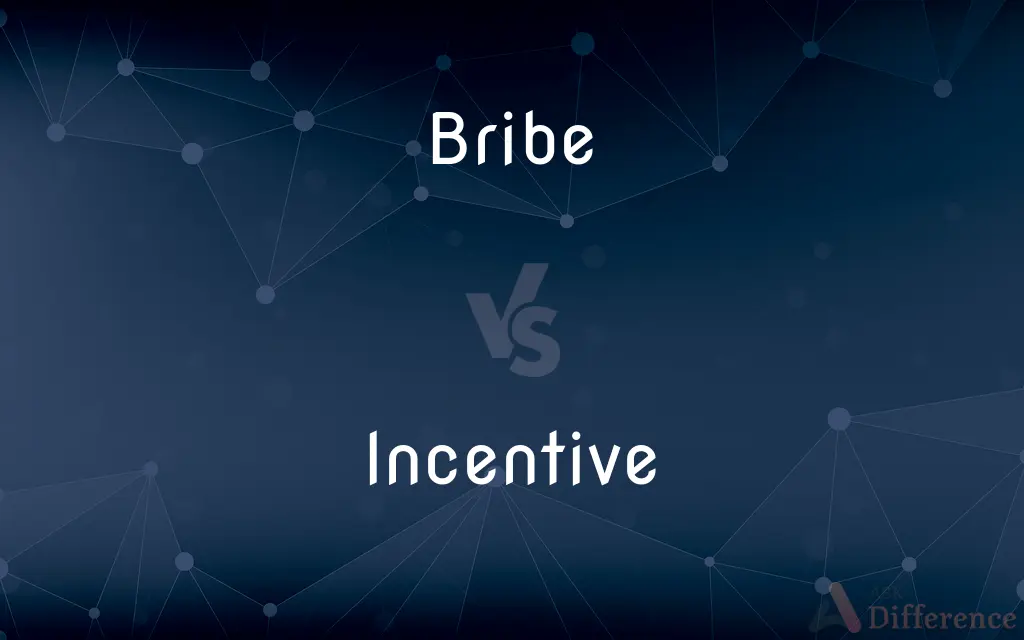Bribe vs. Incentive — What's the Difference?
By Tayyaba Rehman & Maham Liaqat — Updated on April 8, 2024
A bribe is an illicit payment for a favor or advantage, while an incentive is a lawful reward to encourage a desired action.

Difference Between Bribe and Incentive
Table of Contents
ADVERTISEMENT
Key Differences
Bribes are typically offered with the intent to influence someone's actions in an unethical or illegal manner, often to gain some form of personal advantage or to circumvent standard procedures. This could involve a sum of money, gifts, or any other benefit given with the expectation of a reciprocal action that usually involves some form of corruption or ethical compromise. For example, a bribe might be given to a government official to expedite a business permit that would otherwise take a standard amount of time to process. Incentives, on the other hand, are used in a variety of contexts to encourage or motivate individuals to perform certain actions or reach specific goals. Unlike bribes, incentives are legal and are often openly offered by organizations, employers, or governments as a way to promote desired behaviors or outcomes. These can take the form of bonuses, discounts, rewards points, or any form of benefit designed to encourage a particular action or behavior that aligns with the offering party's goals. For instance, an employer might offer a bonus to employees who meet or exceed their quarterly sales targets.
One key difference between a bribe and an incentive is the context in which each is offered. Bribes are typically associated with illegal or unethical activities, where the giver seeks to gain an unfair advantage or influence someone in a position of power in a way that compromises integrity. Incentives, however, are structured within the bounds of legality and ethics, aiming to encourage positive or desired behaviors without compromising the recipient's integrity or the fairness of processes.
The perception of both bribes and incentives can vary greatly depending on cultural, legal, and ethical norms. What might be considered a bribe in one context could be seen as a harmless gift or an incentive in another. This variation underscores the importance of understanding the ethical and legal framework within which these terms operate.
While bribes are inherently problematic due to their association with corruption and unethical behavior, incentives are widely accepted and utilized as effective tools for motivation and encouragement in both the public and private sectors. This distinction highlights the importance of intent and legality in differentiating between the two.
Comparison Chart
Definition
An illicit payment or gift to gain an advantage
A lawful reward offered to encourage a behavior
ADVERTISEMENT
Legality
Illegal and unethical
Legal and ethical
Purpose
To influence or corrupt
To motivate or encourage
Context
Often involves public officials or corruption
Used in both public and private sectors
Perception & Ethics
Generally viewed negatively
Viewed positively as a motivational tool
Compare with Definitions
Bribe
Ethical Compromise.
The bribe involved paying off a reviewer to obtain a favorable audit report.
Incentive
Motivational Reward.
The company offered an incentive for employees who exceeded their sales targets.
Bribe
Illicit Payment.
The contractor offered a bribe to the official to overlook the construction violations.
Incentive
Performance Bonus.
Incentives in the form of year-end bonuses were announced for top performers.
Bribe
Unfair Advantage.
By accepting a bribe, the athlete compromised the integrity of the competition.
Incentive
Behavioral Encouragement.
The government introduced tax incentives to promote renewable energy usage.
Bribe
Corruption.
A bribe was used to secure confidential information that was not publicly available.
Incentive
Encourage Desired Action.
A discount incentive was provided to customers who subscribed early.
Bribe
Covert Transaction.
The bribe was discreetly offered in the form of an expensive holiday package.
Incentive
Legal Reward.
Employees received an incentive for participating in the wellness program.
Bribe
Dishonestly persuade (someone) to act in one's favour by a gift of money or other inducement
They had bribed an official to sell them a certificate
They attempted to bribe opponents into losing
Incentive
An incentive is something that motivates or drives one to do something or behave in a certain way. There are two types of incentives that affect human decision making.
Bribe
A sum of money or other inducement offered or given to bribe someone
Lawmakers were caught accepting bribes to bring in legalized gambling
Incentive
A thing that motivates or encourages someone to do something
Give farmers an incentive to improve their land
Bribe
Money or some other benefit given to a person in power, especially a public official, in an effort to cause the person to take a particular action.
Incentive
Something, such as the fear of punishment or the expectation of reward, that induces action or motivates effort.
Bribe
Something offered to induce another to do something
Tried to use dessert as a bribe to get the child to cooperate.
Incentive
Serving to induce or motivate
An incentive bonus for high productivity.
Bribe
To give, offer, or promise a bribe to.
Incentive
Something that motivates, rouses, or encourages.
I have no incentive to do housework right now.
Bribe
To give, offer, or promise bribes.
Incentive
A bonus or reward, often monetary, to work harder.
Management offered the sales team a $500 incentive for each car sold.
Bribe
Something (usually money) given in exchange for influence or as an inducement to breaking the law.
Incentive
Inciting; encouraging or moving; rousing to action; stimulating.
Bribe
That which seduces; seduction; allurement.
Incentive
Serving to kindle or set on fire.
Bribe
(transitive) To give a bribe to; specifically, to ask a person to do something against his/her original will, in exchange for some type of reward or relief from potential trouble.
Incentive
Inciting; encouraging or moving; rousing to action; stimulative.
Competency is the most incentive to industry.
Bribe
(transitive) To gain by a bribe; to induce as by a bribe.
To bribe somebody's compliance
Incentive
Serving to kindle or set on fire.
Part incentive reedProvide, pernicious with one touch of fire.
Bribe
A gift begged; a present.
Incentive
That which moves or influences the mind, or operates on the passions; that which incites, or has a tendency to incite, to determination or action; that which prompts to good or ill; motive; spur; as, the love of money, and the desire of promotion, are two powerful incentives to action.
The greatest obstacles, the greatest terrors that come in their way, are so far from making them quit the work they had begun, that they rather prove incentives to them to go on in it.
Bribe
A price, reward, gift, or favor bestowed or promised with a view to prevent the judgment or corrupt the conduct of a judge, witness, voter, or other person in a position of trust.
Undue reward for anything against justice is a bribe.
Incentive
A positive motivational influence
Bribe
That which seduces; seduction; allurement.
Not the bribes of sordid wealth can seduce to leave these ever blooming sweets.
Incentive
An additional payment (or other remuneration) to employees as a means of increasing output
Bribe
To rob or steal.
Bribe
To give or promise a reward or consideration to (a judge, juror, legislator, voter, or other person in a position of trust) with a view to prevent the judgment or corrupt the conduct; to induce or influence by a bribe; to give a bribe to.
Neither is he worthy who bribes a man to vote against his conscience.
Bribe
To gain by a bribe; of induce as by a bribe.
Bribe
To commit robbery or theft.
Bribe
To give a bribe to a person; to pervert the judgment or corrupt the action of a person in a position of trust, by some gift or promise.
An attempt to bribe, though unsuccessful, has been holden to be criminal, and the offender may be indicted.
The bard may supplicate, but cannot bribe.
Bribe
Payment made to a person in a position of trust to corrupt his judgment
Bribe
Make illegal payments to in exchange for favors or influence;
This judge can be bought
Common Curiosities
Are incentives always monetary?
No, incentives can also be non-monetary, such as extra vacation days, public recognition, or other forms of reward.
What makes a bribe unethical?
Bribes are unethical because they compromise integrity, promote unfair practices, and often involve illegal activities.
What defines a bribe?
A bribe is an illicit offer or payment made to gain an unfair advantage or to influence someone's actions unethically.
How do societies view bribes vs. incentives?
Societies view bribes negatively due to their association with corruption and unethical behavior, whereas incentives are seen positively as they promote motivation and positive actions.
Is it illegal to offer incentives?
Offering incentives is legal and widely practiced within ethical and regulatory guidelines.
Why are bribes considered harmful?
Bribes undermine fairness, corrupt systems, and distort decision-making processes, leading to inefficiency and inequity.
Can a gift be considered a bribe?
Yes, if a gift is given with the intention to influence someone's actions for personal gain, it can be considered a bribe.
How do incentives work?
Incentives are rewards or benefits designed to encourage specific actions or behaviors, enhancing motivation and performance.
Can the same action be a bribe and an incentive?
The distinction lies in the intent, legality, and context; what constitutes a bribe in one situation may be a legitimate incentive in another.
Can incentives be negative?
Incentives are generally positive, designed to motivate; however, the absence of an incentive can be seen as a negative consequence for not meeting goals.
Are there cultural differences in how bribes and incentives are perceived?
Yes, cultural norms significantly influence the perception of what constitutes a bribe versus an incentive.
What role do incentives play in the workplace?
Incentives play a crucial role in motivating employees, improving performance, and achieving organizational goals.
How can organizations ensure that incentives are effective and ethical?
Organizations can ensure incentives are effective and ethical by aligning them with clear, measurable goals and ethical standards.
How do bribes affect public trust?
Bribes severely damage public trust in institutions by demonstrating that decisions can be influenced through illicit means.
Can incentives lead to unethical behavior?
Poorly designed incentives can inadvertently encourage unethical behavior if they motivate the wrong actions.
Share Your Discovery

Previous Comparison
Real vs. Tangible
Next Comparison
Tree vs. LogAuthor Spotlight
Written by
Tayyaba RehmanTayyaba Rehman is a distinguished writer, currently serving as a primary contributor to askdifference.com. As a researcher in semantics and etymology, Tayyaba's passion for the complexity of languages and their distinctions has found a perfect home on the platform. Tayyaba delves into the intricacies of language, distinguishing between commonly confused words and phrases, thereby providing clarity for readers worldwide.
Co-written by
Maham Liaqat













































